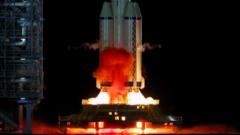As the Shenzhou 19 spacecraft lifted off from the Jiuquan Satellite launch center, the excitement surrounding the mission highlighted China's commitment to extending its celestial reach and potential Moon landing plans by 2030.
China's Youngest Taikonauts Embark on Historic Space Mission

China's Youngest Taikonauts Embark on Historic Space Mission
China's burgeoning space program continues to capture global attention as its youngest astronauts launch from the Gobi Desert in pursuit of lunar ambitions.
In a thrilling launch event at the Jiuquan Satellite launch center in Gansu, China's Shenzhou 19 spacecraft blasted off into orbit, marking a significant milestone with its crew of three taikonauts—Wang Haoze, Song Lingdong, and Cai Xuzhe—who embody the aspirations of a new generation eager to push the boundaries of space exploration. The countdown culminated in a powerful roar as the rocket shot through the skies, illuminating the Gobi Desert below.
This mission comes at a time when China seeks to assert its capabilities as a leading space power, with ambitions that extend to establishing a permanent presence on the Moon by 2030. President Xi Jinping’s vision of becoming a formidable player in space is being pursued with fervor, as the mission's taikonauts prepare for a six-month tenure aboard the Chinese space station, Tiangong, conducting essential scientific experiments and preparing for the challenges of lunar exploration.
The launch attracted a massive crowd in Dongfeng Space City, where enthusiasm for the nation’s space achievements was palpable. Streets adorned with national flags and posters showcasing the spacecraft and President Xi were common sights, as citizens rallied to support their astronauts. The pilots expressed immense pride in their mission, with highlights on the budding potential of the younger crew who bring fresh energy to the program.
Space pioneers from China have already made headlines with recent accomplishments, including a successful lunar sample retrieval mission and the deployment of the Zhurong rover on Mars, positioning China as a key player in the new space race. U.S. officials, while acknowledging these achievements, have also raised concerns regarding the potential militarization of space by China, adding an element of international tension to the burgeoning rivalry.
As China accelerates its ambitions, it reflects a broader context of national pride juxtaposed against a backdrop of competition with the United States. Li Yingliang, director of the Manned Space Agency, emphasized the significance of collaboration over competition, while experts noted the long-term potential for lunar resources and the critical scientific advancements that can arise from space exploration.
While China’s space program continues to develop, challenges remain, including technological complexities and international scrutiny of its motives and capabilities. Yet, under President Xi's leadership, the pursuit of space exploration remains a priority, with aspirations to not only achieve lunar landings but also to contribute to humanity's understanding of outer space.
As the world watches closely, this latest mission symbolizes not just a pivotal moment for Chinese space exploration, but a crucial chapter in the ongoing quest for human discovery beyond our planet.
This mission comes at a time when China seeks to assert its capabilities as a leading space power, with ambitions that extend to establishing a permanent presence on the Moon by 2030. President Xi Jinping’s vision of becoming a formidable player in space is being pursued with fervor, as the mission's taikonauts prepare for a six-month tenure aboard the Chinese space station, Tiangong, conducting essential scientific experiments and preparing for the challenges of lunar exploration.
The launch attracted a massive crowd in Dongfeng Space City, where enthusiasm for the nation’s space achievements was palpable. Streets adorned with national flags and posters showcasing the spacecraft and President Xi were common sights, as citizens rallied to support their astronauts. The pilots expressed immense pride in their mission, with highlights on the budding potential of the younger crew who bring fresh energy to the program.
Space pioneers from China have already made headlines with recent accomplishments, including a successful lunar sample retrieval mission and the deployment of the Zhurong rover on Mars, positioning China as a key player in the new space race. U.S. officials, while acknowledging these achievements, have also raised concerns regarding the potential militarization of space by China, adding an element of international tension to the burgeoning rivalry.
As China accelerates its ambitions, it reflects a broader context of national pride juxtaposed against a backdrop of competition with the United States. Li Yingliang, director of the Manned Space Agency, emphasized the significance of collaboration over competition, while experts noted the long-term potential for lunar resources and the critical scientific advancements that can arise from space exploration.
While China’s space program continues to develop, challenges remain, including technological complexities and international scrutiny of its motives and capabilities. Yet, under President Xi's leadership, the pursuit of space exploration remains a priority, with aspirations to not only achieve lunar landings but also to contribute to humanity's understanding of outer space.
As the world watches closely, this latest mission symbolizes not just a pivotal moment for Chinese space exploration, but a crucial chapter in the ongoing quest for human discovery beyond our planet.





















